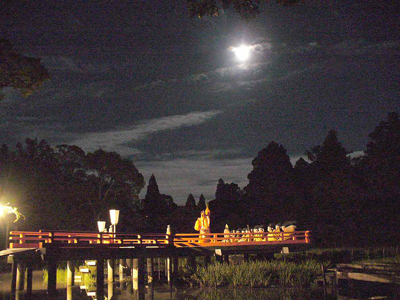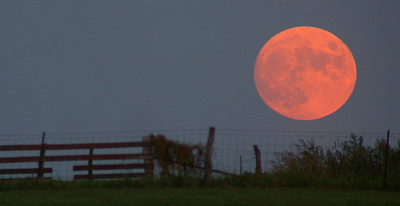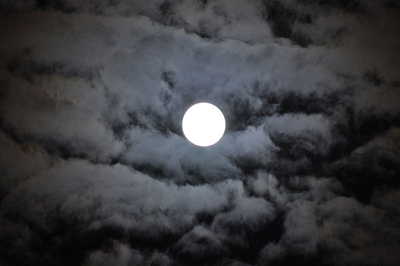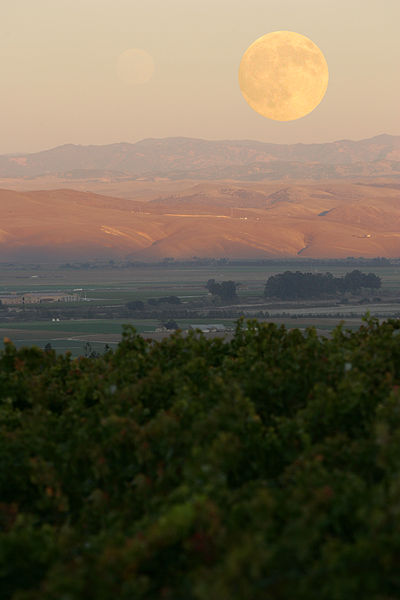Moon River
A Japanophile acquaintance, David, stopped by my office last week, hoping to see the "nerve center" of Joy o' Kanji, as he put it! He brought me three kanji books, as well as Japanese desserts associated with a moon-viewing (µ£łĶ”ŗ, ŃüżŃüŹŃü┐) festival.

Image Credit: N yotarou
Harvest moon–viewing ceremony (Ķ”│µ£łńźŁ, ŃüŗŃéōŃüÆŃüżŃüĢŃüä) at Magatama Pond in a garden attached to a shrine (Ķ▒ŖÕÅŚÕż¦ńź×Õ««, Ńü©ŃéłŃüåŃüæŃüĀŃüäŃüśŃéōŃüÉŃüå) in Ise City, Mie Prefecture.
With the moon on his mind, he jotted down a poem that our mutual friend Noriji Otani had taught him many moons ago:
µ£łµ£łŃü½µ£łĶ”ŗŃéŗµ£łŃü»ÕżÜŃüæŃéīŃü®
µ£łĶ”ŗŃéŗµ£łŃü»ŃüōŃü«µ£łŃü«µ£ł
Ah, a veritable river of moons streams through that poem! But what's going on here? Fortunately, David supplied the yomi:
ŃüżŃüŹŃüźŃüŹŃü½ ŃüżŃüŹŃü┐ŃéŗŃüżŃüŹŃü» ŃüŖŃüŖŃüæŃéīŃü®
ŃüżŃüŹŃü┐ŃéŗŃüżŃüŹŃü» ŃüōŃü«ŃüżŃüŹŃü«ŃüżŃüŹ
Clever! Not only does µ£ł repeat but the poet also made it so that the yomi is always ŃüżŃüŹ. That seems hard to do!
Along with the yomi, David provided this translation:
There are many months for viewing the moon, but the month for viewing the moon is the moon-viewing month.
On one website, I found confirmation of all this, as well as the following interpretation of what µ£ł means each time:
µ£łµ£łŃü½µ£łĶ”ŗŃéŗµ£łŃü»ÕżÜŃüæŃéīŃü®
µ£łĶ”ŗŃéŗµ£łŃü»ŃüōŃü«µ£łŃü«µ£ł
In µ£łµ£ł: months
In µ£łĶ”ŗŃéŗ: moon
In µ£łŃü»: month
In µ£łĶ”ŗŃéŗ: moon
In µ£łŃü»: month
In ŃüōŃü«µ£ł: month
In µ£ł: moon
This made perfect sense to me! I was surprised, therefore, that my proofreader took a different slant on the matter. He said he preferred to translate the last two list items the other way around. This, then, would be the overall translation:
Of all the months, there are many months for viewing the moon, but the (best) month for viewing the moon is the month with this (very) moon.
Wow, it does work if you reverse the meaning of the last two µ£łs!
Referring to this as a classic poem, he labeled it a tanka because it contains 31 syllables. To be precise, it's a ńŗ鵣ī (ŃüŹŃéćŃüåŃüŗ: comic tanka). He noted that the poem includes eight instances of µ£ł and found a site that deemed this number significant. As the site explains, the ideal moon-viewing month is the eighth month in the traditional Japanese lunar calendar. The full moon occurs on the 15th day of that lunar month, a day that typically falls in September or October if we shift over to the more familiar solar calendar. The moon to be admired at that time is actually the harvest moon.

Photo Credit: Roadcrusher
One thing still bothered me. When µ£ł means "month," I almost always see it with the yomi of Ńé▓Ńāä or Ńé¼Ńāä. When should we associate ŃüżŃüŹ with the monthly µ£ł? I asked my proofreader, and he provided a few examples:
Õż¦Ńü«µ£ł (ŃüĀŃüäŃü«ŃüżŃüŹ: long month (i.e., with 31 days))
Õ░ÅŃü«µ£ł (ŃüŚŃéćŃüåŃü«ŃüżŃüŹ: short month (i.e., with fewer than 31 days))
Interesting! One day makes the difference between months that are long and short (or big and little, going with the meaning of the initial kanji).
He said you can't read those µ£łs as Ńé▓Ńāä because that yomi hardly ever stands alone.
Another example is a bit archaic, he says, but here it is anyway:
µ£łŃü«ŃééŃü« (ŃüżŃüŹŃü«ŃééŃü«: menstruation)
This literally translates as "the thing of the month," which sounds to me like "the special of the day," though not nearly as appealing!
Then, too, there's the pattern that starts with these two words:
Ńü▓Ńü©µ£ł (Ńü▓Ńü©ŃüżŃüŹ: 1 month)
ŃüĄŃü¤µ£ł (ŃüĄŃü¤ŃüżŃüŹ: 2 months)
etc.
Although one could write these terms as õĖƵ£ł, õ║īµ£ł, etc., people avoid doing so because readers would interpret them as ŃüäŃüĪŃüīŃüż (January), Ńü½ŃüīŃüż (February), and so on.
My proofreader offered this generalization (one that's very loose and has many exceptions):
• ŃüżŃüŹ prevails when people refer to a particular month.
• ŃüÆŃüż prevails when people refer to a period of time.
An example of each should make the difference clearer:
õĖĆńĢ¬Õ»ÆŃüäµ£ł (ŃüäŃüĪŃü░ŃéōŃüĢŃéĆŃüäŃüżŃüŹ)
õĖĆńĢ¬Õ»ÆŃüäõĖĆŃāȵ£ł (ŃüäŃüĪŃü░ŃéōŃüĢŃéĆŃüäŃüäŃüŻŃüŗŃüÆŃüż)
The first refers to a specific month that's the coldest of the year. It could be December or February, but in any case this phrase makes us think of a particular page on a 12-month calendar. By contrast, õĖĆńĢ¬Õ»ÆŃüäõĖĆŃāȵ£ł represents the coldest 31-day span (e.g., January 15 through February 14).
Hard to remember? Maybe. But just think of English; "moon" and "month" are so closely related that people once said things like "Many moons ago ...." Same goes for ŃüżŃüŹ. It conjures up images of moons, months, and a poem that sounds like a tongue twister but may better qualify as a brain twister!

Photo Credit: Schyler
There's a new essay out this week—essay 1156 on ĶÖÜ (void, vacant; false, falsehood; futile). To some extent it focuses on spaces that are the inverse of the full moon, such as the crater of a volcano. A sneak preview:

Have a great weekend!


Comments